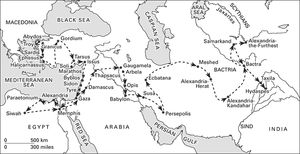King of Macedon (336–323), the son of Philip II. He was a pupil of Aristotle. After his succession he invaded Achaemenid Persia, liberating the Greek cities in Asia Minor, and then defeating the Persians in Egypt, Syria, and Mesopotamia. While in Egypt he founded Alexandria (332 bc), his first and best‐known city. He decided to rule the Persian empire in cooperation with the Persian nobles, some of whom he appointed as his governors. He went on to extend his conquests eastwards, taking Bactria and the Punjab. He died of a fever at Babylon, and his empire quickly fell apart after his death. Regarded as a god in his lifetime, he became a model for many subsequent imperialist conquerors of antiquity, and the subject of many legends.

Alexander the Great. Alexander’s victorious progress through Asia Minor against the Persians culminated in the defeat of King Darius at Issus (333 bc). Advancing through Phoenicia, where he met resistance from Tyre and Gaza, he reached Egypt in 332 and was welcomed as a liberator. After founding Alexandria he turned eastwards and won a decisive battle at Gaugamela (331). Babylonia offered no serious resistance and he advanced through Batria to the Jaxartes, founding Alexandria-the-Furthest as a defence against nomadic Scythians. His defeat of the Indian ruler Porus on the Hydaspes (326) took him into new territory, but his weary soldiers persuaded him to turn back. On the return journey he sailed down the Hydaspes to the Indus delta, as he was anxious both to conquer Sind and to see ‘Ocean’, the great river that was believed to encircle the world. After a gruelling desert march he reached Susa in 324. Alexander died at Babylon in 323, in his 33rd year.
Source: MAPS IN MINUTES™ © RH Publications (1997)